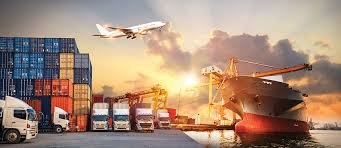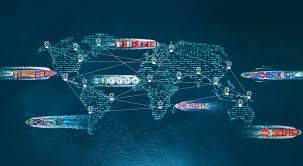In 2025, the world is facing intense trade tensions. Major economies like the US, China, and the European Union are battling over tariffs, supply chains, and economic influence. While these giants struggle, the United Arab Emirates (UAE) is emerging as a key player in global trade. Its strategic location, advanced infrastructure, and smart policies are helping it benefit from the ongoing global uncertainties.
A Strategic Location That Gives an Edge

The UAE sits at the crossroads of Asia, Europe, and Africa. This makes it an ideal hub for international trade. Major shipping routes pass through the region, making the country a perfect spot for businesses looking to move goods quickly and efficiently. Dubai’s Jebel Ali Port, one of the world’s busiest, plays a crucial role in global logistics. The UAE’s airports, especially Dubai International and Abu Dhabi International, also rank among the busiest for cargo transport. The nation’s ability to handle large volumes of trade efficiently has strengthened its reputation as a vital trade hub.
In addition to its geographic advantage, the UAE has invested significantly in expanding its logistics and transport infrastructure. The construction of new port facilities, free zones, and high-speed rail projects, such as the Etihad Rail network, further enhance its capabilities. The government is also pushing forward with smart technology in logistics, including artificial intelligence and automation, to streamline trade operations and reduce costs for businesses.

Adapting to Shifting Trade Alliances

With tensions between the US and China disrupting traditional trade flows, many companies are looking for alternative supply chain routes. The UAE is taking advantage of this shift by strengthening trade ties with both sides. It has increased partnerships with Asian economies while also maintaining strong connections with Western countries. This balanced approach has helped it become a neutral and reliable trade hub.
The UAE’s growing role in regional trade agreements is also worth noting. It has entered into economic partnerships with India, Brazil, and African nations to create smoother trade relations. As traditional global trade corridors face disruption, these partnerships give the UAE an edge in securing new markets. Furthermore, the country is working on enhancing its trade links with the Gulf Cooperation Council (GCC) nations, ensuring a stronger regional economic network.
The Rise of Free Zones and Business-Friendly Policies
One of the UAE’s biggest advantages is its network of free zones. These zones allow companies to operate with full foreign ownership, zero taxes, and simplified customs procedures. Free zones such as Dubai Multi Commodities Centre (DMCC), Abu Dhabi Global Market (ADGM), and Jebel Ali Free Zone (JAFZA) have attracted thousands of international businesses. The country’s commitment to a business-friendly environment continues to make it an attractive destination for investors.
In addition to free zones, the UAE government has introduced new policies to attract foreign direct investment (FDI). The UAE’s Golden Visa program, for example, offers long-term residency to entrepreneurs and investors, making it easier for businesses to set up and grow in the country. These pro-business policies are ensuring that the UAE remains a top destination for international trade and commerce.
A Leader in Digital and Sustainable Trade
The UAE is not just focusing on traditional trade. It is investing heavily in digital trade platforms and blockchain technology to make transactions faster and more secure. Dubai has launched blockchain-based systems for customs and logistics, reducing paperwork and improving efficiency.
E-commerce is also playing a significant role in the UAE’s trade strategy. The rise of online shopping and digital transactions has pushed the country to develop state-of-the-art digital infrastructure. Companies like Amazon, Noon, and local logistics providers are expanding their operations in the UAE to cater to a growing online consumer base. The government is also supporting small and medium enterprises (SMEs) by providing digital trade solutions and incentives to help them enter international markets.
Sustainability is another key focus. The UAE is promoting green trade initiatives, including investments in renewable energy and eco-friendly logistics. The government is actively encouraging businesses to adopt environmentally friendly practices, such as reducing carbon emissions in shipping and transportation. As global businesses face pressure to adopt sustainable practices, the UAE’s leadership in this area is making it a preferred trade partner.
Strengthening Ties with Emerging Markets
As Western economies slow down, the UAE is shifting focus to fast-growing markets in Africa, South America, and Southeast Asia. The country has signed multiple trade agreements and investment partnerships with nations in these regions. By doing so, it is securing a future where its trade network is diverse and not overly dependent on any single economy.
Africa, in particular, is becoming a key focus for the UAE. The country has launched initiatives to enhance trade with African nations, including investment in infrastructure projects and logistics hubs. The UAE’s DP World, a leading global port operator, has expanded its presence in several African countries, improving trade routes and supply chain efficiency. By positioning itself as a gateway for African trade, the UAE is creating new economic opportunities.
The Future of the UAE’s Trade Strategy
Looking ahead, the UAE is expected to continue its rise as a global trade powerhouse. Its adaptability, advanced infrastructure, and strategic policies are positioning it as a critical link in international trade. While major economies struggle with trade wars and supply chain disruptions, the UAE is proving that smart positioning and proactive policies can turn global challenges into opportunities.
To maintain its competitive edge, the UAE is likely to continue investing in technological innovation. Artificial intelligence, automation, and data-driven logistics solutions will play a crucial role in enhancing trade efficiency. The government is also expected to introduce more trade-friendly regulations to attract global businesses.
Furthermore, the UAE’s commitment to diversification ensures that it is not reliant on any single sector or market. By expanding its trade relationships with a wide range of partners, the UAE is securing long-term economic stability.
With continued investment in technology, sustainability, and new markets, the UAE is set to remain a key player in global trade for years to come. Its forward-thinking strategies, combined with a strong business-friendly environment, make it one of the most resilient and dynamic economies in the world today.
Also read: How the Middle East Is Quietly Becoming a Global Leader in Renewable Energy













